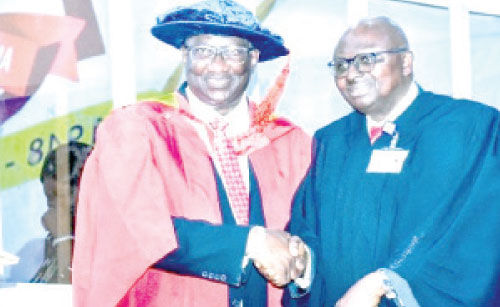A cancer expert, Professor Adeniyi Adenipekun, said the current efforts to subside cancer drugs for accessibility to patients, such as HIV drugs, are commendable but improvement.
Professor Adenipekun, in an inaugural he delivered at the University of Ibadan entitled “Dealing with Rebellion in the Commonwealth of Cells with Guided Missiles: That the Obedient May Live,” said the Cancer Access Programme (CAP), through which these patients receive these drugs at reduced costs, also needs to be fine-tuned to improve its accessibility and early funding of wallets.
Adenipekun declared that currently, many patients would have almost completed their treatment from borrowed funds before the fund would be available for access, and unfortunately, refunds are not permitted.
He called for the National Health Insurance Scheme (NHIS) to incorporate cancer management to reduce the economic burden of cancer on families, even as the Federal Ministry of Health should enhance its National Cancer Control Programme’s effectiveness and the National Institute for Cancer Research and Treatment in Nigeria should be well funded.
The don said although, by WHO recommendation, there should be one set of therapy machines for every 250,000 people, Nigeria only has 10 units, five of which are functioning and creating unnecessary bottlenecks for cancer patients to receive treatment.
According to him, “The primary goal of radiotherapy is to eliminate abnormal, rebellious cells so that obedient cells can live. State governments should invest in cancer management, as the Kano State government has done by investing so much in cancer treatment facilities, especially radiotherapy machines.”
Professor Adenipekun urged individuals to improve their health behaviours, encourage regular checkups, incorporate physical activities, take alcohol in moderation, as well as avoid cigarette smoking, sedentary lifestyles, and obesity to prevent cancer development and to promote a healthier lifestyle.
He, however, said that cancer cells can be likened to a group of citizens or noncitizens of a country that have rebelled against the authority of the country or territory and are determined to completely upend the country by displacing everyone else.
The don declared that cancer cases are rising in Nigeria, with breast cancer as the most common female cancer in Nigeria, followed by cervical cancer, while prostate cancer is very common in men.
He said the exact cause of cancer in an individual may not be easy to establish, as most times the cause is multifactorial.
The cancer expert highlighted challenges of management of cancer patients to include inadequate funding of healthcare, inadequate treatment facilities, dearth of healthcare professionals to perform radiotherapy, cost of diagnosis, cost of drugs, and late presentation.
“Late presentation remains a challenge due to ignorance, cultural, religious belief, poverty, lack of screening facilities, and poor uptake of available immunisation,” he added.
READ ALSO: UK deports 44 Nigerians, Ghanaians in single flight — Home Office
